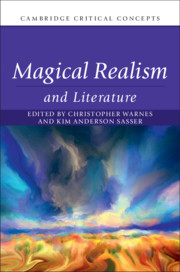Book contents
- Magical Realism and Literature
- Cambridge Critical Concepts
- Magical Realism and Literature
- Copyright page
- Contents
- Contributors
- Introduction
- Part I Origins
- Chapter 1 Magic and Otherness
- Chapter 2 Primitivism, Ethnography and Magical Realism
- Chapter 3 Magical Realism and Indigeneity
- Chapter 4 Insubstantial Selves in Magical Realism in the Americas
- Chapter 5 Space, Time and Magical Realism
- Part II Development
- Part III Application
- Bibliography
- Index
Chapter 2 - Primitivism, Ethnography and Magical Realism
from Part I - Origins
Published online by Cambridge University Press: 22 October 2020
- Magical Realism and Literature
- Cambridge Critical Concepts
- Magical Realism and Literature
- Copyright page
- Contents
- Contributors
- Introduction
- Part I Origins
- Chapter 1 Magic and Otherness
- Chapter 2 Primitivism, Ethnography and Magical Realism
- Chapter 3 Magical Realism and Indigeneity
- Chapter 4 Insubstantial Selves in Magical Realism in the Americas
- Chapter 5 Space, Time and Magical Realism
- Part II Development
- Part III Application
- Bibliography
- Index
Summary
Magical realism, primitivism and ethnography are historically and theoretically interrelated discourses. Mavellous folk and fairy tales, legends and myths are remote origins that received renewed attention with the rise of the avant-grade and American archaeology in the early twentieth century. In the Hispanic tradition, antecedents date back to medieval lore, which inspired chivalric and pastoral romances as well as the picaresque novel, finding a seminal synthesis in Don Quixote. In the New World, the Chronicles of the Indies, with their outlandish tales of discovery, drew not only from medieval and early Renaissance worldviews, but also from marvellous sources as varied as John Mandeville, Marco Polo, Ptolemy, Pliny and the Bible. Latin American authors have consistently cited these sources of magical realism, yet they looked at them through the prism of the avant-garde. Alejo Carpentier conceived of his seminal concept of lo real maravilloso americano as an answer to the Surrealists’ artificial merveilleux. Carpentier and Miguel Ángel Asturias, with his Surrealist view of the ancient Maya, coincided in late 1920s Paris with avant-garde primitivism and another magic realist, Venezuelan Arturo Uslar-Pietri, a close associate of Massimo Bontempelli, whose version of magical realism became their true spark, whereas Franz Roh’s influence in Latin America was negligible. Later authors like Juan Rulfo and Gabriel García Márquez significantly developed magical realist narratology, consolidating the Latin American trend and making it indispensable for understanding its international expansion based on the allegorical reinterpretation, and subversion, of dominant history – a crucial postcolonial endeavour for cultures around the world.
Keywords
- Type
- Chapter
- Information
- Magical Realism and Literature , pp. 30 - 48Publisher: Cambridge University PressPrint publication year: 2020
- 2
- Cited by



